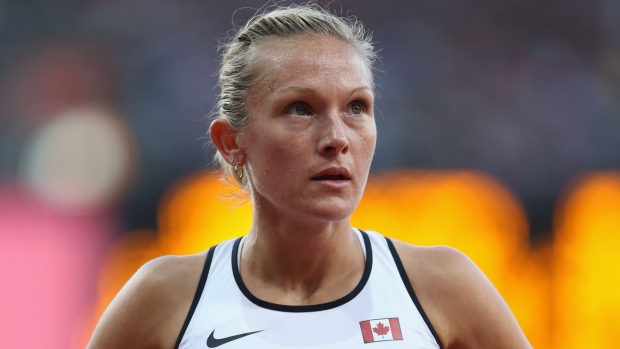Nov 9, 2015
Canadian track and field athletes applaud WADA's crackdown on Russian team
Hilary Stellingwerff will breathe easier knowing the field next summer in Rio should be cleaner.
The Canadian Press

TORONTO - It was a moment stolen from Hilary Stellingwerff.
The Canadian missed qualifying for the women's 1,500-metre final at the 2012 London Olympics by just one spot — a final that, as it turns out, was full of drug cheats.
Since those Games, three of the finalists — including the gold medallist — have been disqualified for doping infractions. And Russia's fourth-place finisher Tatyana Tomashova had already served a doping suspension.
"I was so gutted in London to miss the final by just a hair, because I knew that there were girls in there that shouldn't be," Stellingwerff said. "You just know athletes shouldn't be in there, and it's just like 'Come on!'"
Stellingwerff greeted Monday's accusations of widespread, state-supported doping in Russian track and field with mixed feelings, calling it a "little bit gut-wrenching, and a little bit not surprised." The 34-year-old from Sarnia, Ont., will breathe easier knowing the field next summer in Rio should be cleaner. But it can't replace what Stellingwerff missed out on in London.
"I think a lot of things would be different, but it's hard to go back," Stellingwerff said. "There's shoe contracts. There's carding (athlete funding) from Athletics Canada, that changes if you're a finalist. There's so many endorsements. There's the prize money, the races you don't get in because the spots are taken up by athletes that shouldn't be there.
"Going into Rio, maybe I can actually have some of the success that I missed in previous years because of these athletes that shouldn't be there," she added. "It just sucks for me looking back on the past 10 years. I wish it had come earlier. But there's nothing you can do and you just hope for the future of athletics that it gets better."
The World Anti-Doping Association's report Monday of doping and cover-ups was reminiscent of the systematic cheating by the former East Germany. And while it's another massive black mark on the sport, Athletics Canada's head coach Peter Eriksson said it's good news from a Canadian perspective.
"Because we're not a country that cheats, we're a country that can stand up through all of this fog and say 'Look at us, we're a clean country, we're doing X, Y and Z,'" Eriksson said.
Paul Melia, president and CEO of the Canadian Centre for Ethics in Sports, Canada's anti-doping agency, reacted to WADA's report late Monday.
"The findings are profoundly disturbing and extremely disappointing," said Melia in a statement. "WADA has put the rules in place and is mandated to oversee anti-doping efforts around the world; but, clearly, this report confirms there's still a long way to go before we have a level playing field for athletes who choose to compete clean.
"And it's not just a problem in Russia, and not just a problem in athletics. The findings released today will impact all athletes and all sports. Without clear values to help shape the system, greed, corruption, winning-at-all-costs and other threats can take over."
Canada won an unprecedented eight medals at the world championships in August, proof, say some, that a crackdown on doping is showing in results.
"Canadian athletes proved this year that we can be the best in the world when the playing field is level," race walker Evan Dunfee wrote in a Twitter post Monday. "The Beijing world champs were the cleanest champs in over a decade in my opinion and Canada saw its best performance ever (while not so ironically, Russia had its worst). We have to be resolute in our stance for clean sport."
Russia had no race walkers in Beijing due to doping infractions, while Canada's Ben Thorne won the country's first-ever world medal in the discipline — bronze in the 20-kilometre race.
But Canadian athletes said they hope WADA and the IAAF widen the search, saying the problem extends beyond just the Russian team.
"The IAAF has to look top to bottom at every country," said hammer thrower Jim Steacy. "Every country needs to be put under the microscope, and they need to just kind of start from scratch."
"It's just something that you kind of always think about," marathoner Reid Coolsaet said on competing against drug cheats. "For sure there's guys who are ahead of me at the Olympics who I'm suspicious of. And not necessarily the Russians."
Eriksson laments the clean Canadian athletes such as Stellingwerff who have paid the price in the past.
"She might have had a chance at a medal even," Eriksson said. "What are we going to tell them? 'Sorry, we were not on the ball at the right time?'
"You can't backtrack that, there's no apology that can help them. They got shafted by a system that wasn't doing their due diligence, and that's the sad part with it."
